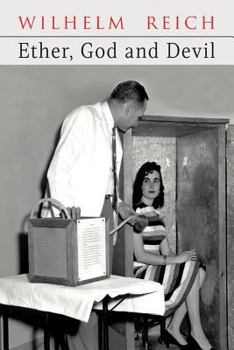Ether, God and Devil
Select Format
Select Condition 
Book Overview
These companion volumes, long out of print, are now presented together for the first time so that the reader may better grasp their essential unity. In Ether, God and Devil, Wilhelm Reich describes... This description may be from another edition of this product.
Format:Paperback
Language:English
ISBN:1684222974
ISBN13:9781684222971
Release Date:January 2019
Publisher:Martino Fine Books
Length:130 Pages
Weight:0.68 lbs.
Dimensions:0.3" x 6.1" x 9.2"
Customer Reviews
1 rating
How Cosmic Orgone Underlies Sex and Cosmogenesis
Published by Thriftbooks.com User , 23 years ago
In this late reflection, composed of two books written in the late 1940s and early 1950s, Reich stands back to reflect on the journey that brought him to his mature view of orgonomic functionalism. He details his struggles with Freud on the concept of the death drive and the notion that the primary drives in the unconscious are negative and destructive of order. In rejecting both the death drive (Freud in 1920) and in seeing the core of the unconscious as expressing itself through positive orgonomic streamings, he was able to break free from symptom analysis and talk about the total character structure and its armoring. While symptoms could be isolated by the talking cure, the consequent revelation usually failed to unleash the deep affect that should accompany the traumatic memory. Reich discovered that the center of the painful memory is a blockage in positive genital life-energy. This muscular and emotional blockage is best seen as an armoring in which a counter-cathexis moves back into the psychic economy and stops the healthy outward flow of orgone. From this realization of character and its armoring, Reich moved on to a study of bioenergetic fields and mircoscopic phenomena. In his last years he pushed much further into the inner logic of this general energy called "orgone" and found that it was more basic than any form of electromagnetic energy. In his final extrapolations he created a cosmology of cosmic superimposition in which he argued that a deep energy caused two separate orgone systems to superimpose themselves on each other, often in a wave or spiral pattern. This became his model for the genesis of galaxies. Hence Reich started his career with a reworking of Freud's libido theory and ended up with an orgonomic cosmology that showed (or so he hoped) the role of orgone in all forms of life and growth. He further inverts Freud by taking Freud's negative concept of the "oceanic feeling" and transposes it into a positive cosmic and "true religious" feeling that connects the self to the infinite universe. In a strange way, these two short books represent a kind of transcendentalist religion of nature, even though Reich was deeply suspicious of religion and mysticism (often equating them with patriarchy and the emotional plague). Students of Reich who have not read these later works, partly written in English, miss some of the poetic power and visionary quality of this radical naturalist and psychoanalyst.






